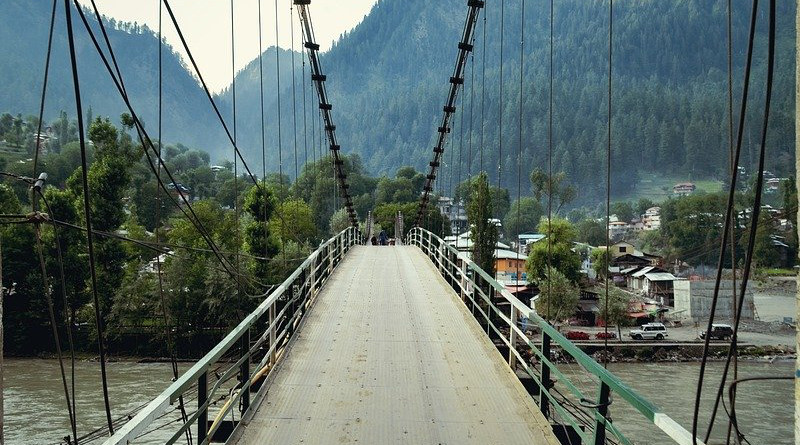Tale of Kashmir – OpEd
The stories and cries of Kashmiris have been louder than the conflicting narratives about Kashmir. Kashmir always had a rich tradition of storytelling. Narrating folktales was a part of Kashmiri culture. They were told in the form of prose and poetry. Their themes mostly used to be the land of Kashmir and tribute to elderly Kashmiri folks who fought for their freedom and independence. For decades, folktales in Kashmir have also been carrying the stories of bravery and wars. The Kashmir Dispute has always stoked powerful feelings and produced heartbreaking stories. However, gone are the days when the stories about love, people and fantasies were narrated to Kashmiri Kids. Today, a new generation of young kids and educated boys hear the stories about oppression and violence. They come across the stories where a generation of Kashmiris is being pushed against the wall, pushed to take up the gun and to take up violence.
One of such contemporary stories is germane to the Kashmir Solidarity Day worldwide, especially in Pakistan. It is observed on February 5 every year. In the 1930s, the day was observed to express camaraderie with the Kashmiris’ struggle against the autocratic Dogra ruler Maharaja Hari Singh. Officially, Pakistan began observing February 5 as the Kashmir Day to reiterate solidarity with the people of Jammu and Kashmir (J&K) in 2004. The day ignites the tales of the struggle of Kashmiri people for their inalienable right to self-determination. It also sheds light on how despite the fact that Articles of the Indian Constitution conferring special status to Muslim-majority Jammu & Kashmir have previously been abolished and restrictions have been in place since August 5, 2019.
Since the partition of Sub-Continent, J&K has been a source of tension between India and Pakistan. An increasing number of nations, even previously quiet ones, are speaking out against Indian operations in Illegally Occupied Kashmir (IIOJ&K). Kashmiri poets and politicians are demanding that India must relinquish its claim on individuals who do not want to be part of the nation in order to repair Kashmir. India is unable to assist. This, on the other hand, is improbable. If an internal problem had been sufficient grounds for action in the genocides in Rwanda and Bosnia, no one would have interfered. Several presidents who participated in the aforementioned genocides, according to history, used this argument to justify their actions before being toppled. Indian Prime Minister Narendra Modi has been committing genocide for a long time, and he is fully aware of the situation. He is also known for launching a coup while serving as Gujarat’s Chief Minister from 2002 to 2004, earning him the moniker “Butcher of Gujarat.”
A year after Modi rose to national prominence, conditions in the disputed Muslim-majority district had already deteriorated to an all-time low. Things deteriorated much worse during Modi’s rule. Modi’s diabolical genius concocts new methods to inflict suffering on the imprisoned just when we think we have reached rock bottom. Hundreds of innocent people have been slaughtered by Indian occupying soldiers in the previous several years, while the slain liberation fighters have gone unnoticed. Indian journalists are being imprisoned for their courage in reporting on government and military wrongdoing. By permitting the government to judge what is real and what is false rather than the facts themselves, the new legislation lays the groundwork for increasing tyranny of the fourth estate and the people of Kashmir.
While everyone wants the conflict in Kashmir to be addressed, it has reached at a stage when world countries must intervene and push India to talk. A fresh chance has emerged to persuade the world community that each princely state had the choice of joining India or Pakistan or remaining independent under the 1947 Indian Independence Act by the British government. Denying the people of Kashmir their right to self-determination would be a major breach of UN Resolutions and international law, given the success of referendums in delivering independence to East Timor and South Sudan.
No matter what, the Kashmir Dispute remains an international dispute. The day reminds the Kashmiri people that Pakistan has not left them alone. Pakistan, being one of the stakeholders in the dispute, should reflect on why the rest of the world has not embraced its logical reasoning as it remembers this day every year. On the diplomatic front, Pakistan must quickly restructure its foreign policy in order to effectively counter the Indian narrative. Pakistani ambassadors should also be more actively engaged in lobbying for Kashmir’s cause. The Government of Pakistan must convene an international conference on Kashmir Dispute as soon as possible to secure the support of friendly nations. The story of Kashmir did not start in 1947 and will not end on Solidarity Day.
*Gulshan Rafiq, the writer works for Islamabad Policy Research Institute (IPRI).

